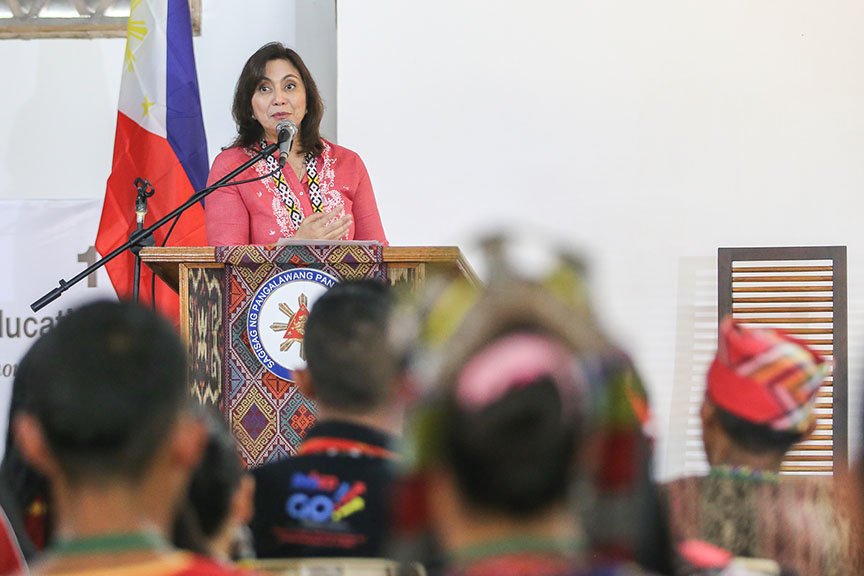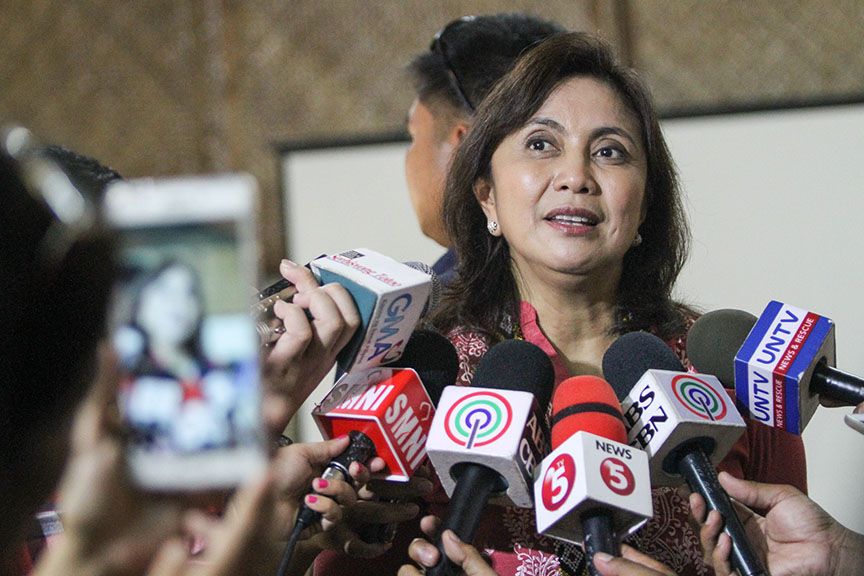 Vice President Leni Robredo delivers a message to participants of the National Indigenous Peoples (IP) Education Festival at the Pamulaan Center for IP Education, University of Southeastern Philippines, in Davao City on Monday (15 May 2017). MindaNews photo by Manman Dejeto
Vice President Leni Robredo delivers a message to participants of the National Indigenous Peoples (IP) Education Festival at the Pamulaan Center for IP Education, University of Southeastern Philippines, in Davao City on Monday (15 May 2017). MindaNews photo by Manman Dejeto
DAVAO CITY (MindaNews / 15 May) – Vice President Leni Robredo said she wants a law version of the department order giving indigenous people (IP) a mandatory representation in policy-making bodies and other local legislative councils issued by her late husband, former Interior and Local Government Secretary Jesse Robredo, in October 2010.
During “Leap V: 2017 National Indigenous Peoples Education Festival” at the University of Southeastern Philippines (USEP) Mintal Campus here Monday, Robredo told reporters that a measure must be passed in Congress to ensure the continuity, widen the IP’s participation in government, and provide equal opportunity to hold positions in government.
She said the order issued by her husband can be overturned with the change of administration.
Robredo said that there is currently no law that mandates IP participation in local development and local legislative councils. RA 8371 or the Indigenous Peoples’ Rights Act (IPRA) provides under Section 16 that the Lumads “have the right to participate fully, if they so choose, at all levels of decision-making in matters which may affect their rights, lives and destinies through procedures determined by them as well as to maintain and develop their own indigenous political structures.”
It also said the State shall ensure that the Lumads be “given mandatory representation in policy-making bodies and other local legislative councils.”
“We are pushing for this because what we have is just the department order issued by my husband,” she added, referring to the memorandum circular 2010-119 signed on October 20, 2010`.
The late Secretary Robredo served under former President Benigno S. Aquino III before he died in a plane crash on August 18, 2012 in the sea off Masbate after attending the Criminal Investigation and Detection Group-Community Investigative Support national summit in Cebu.
The vice president said she wants this law to include provisions that would penalize government bodies that would fail to comply.
“Our policies are insufficient and there’s no means for us to know that it is so unless they tell us,” VP Robredo said, referring to the IPs. “The very key to this is to give them the chance to draft for themselves the policies they think are necessary. It is not for us to dictate,” she added.
By giving IPs more voice in the society, she believes it will give them more space to address the needs of their communities and contribute to their empowerment.
 Vice President Leni Robredo answers questions from the media after delivering a message to participants of the National Indigenous People (IP) Education Festival. MindaNews photo by Manman Dejeto
Vice President Leni Robredo answers questions from the media after delivering a message to participants of the National Indigenous People (IP) Education Festival. MindaNews photo by Manman Dejeto
“We want to advocate for the empowerment of the IPs. Empowerment, in a sense, to give them spaces where the IPs can participate in decision-making bodies in government as well as in policy-making. Wherever we go, there is still the same complaint,” she said.
The vice president also saw the need to revisit the current IP laws, which she said are sometimes used to oppress them.
But Robredo added it should the IPs themselves who will craft the laws to make them more aligned to their needs.
She called for the expansion of the National Commission on Indigenous Peoples (NCIP) to allow more participation from the IPs in the programs.
“We have to give them voice because they feel they are misunderstood, so we have to address that feeling of being left behind,” Robredo said.
She acknowledged that there are already government programs in place for the poor Filipinos, but the tribes complained these are not necessarily responsive to their needs. (Antonio L. Colina IV / MindaNews)
